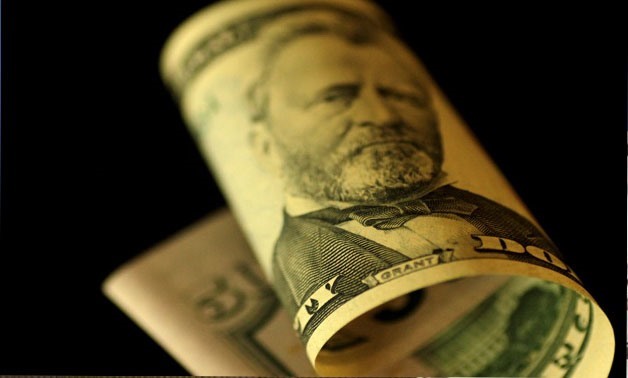
A U.S. Dollar note is seen in this June 22, 2017 illustration photo. REUTERS/Thomas White/Illustration/File Photo
LONDON - 3 May 2018: World stocks made little progress on Thursday as worries over global trade tensions weighed, while the U.S. dollar consolidated recent bumper gains after the Federal Reserve reaffirmed the outlook for more rate hikes.
The MSCI world equity index, which tracks shares in 47 countries, traded flat in percentage terms. Europe’s pan-European STOXX 600 index was down 0.1 percent as the euro held firm.
As the Fed policy meeting threw up no surprises with rates left unchanged, the focus shifted back to simmering trade tensions between the United States and China, as well as the ongoing first quarter earnings season.
In Europe, earnings disappointments from medical technology company Smith & Nephew and postal services provider Bpost soured the mood as the stocks fell 5.9 percent and 10.9 percent respectively, while German drug and crop chemicals maker Bayer flagged a stronger euro in its update.
E-Mini futures for the S&P 500 crept 0.3 percent higher, with overnight results from Kraft Heinz, Tesla and Spotify in focus.
So far it has been a strong earnings season, with the year-on-year blended earnings growth estimate coming in at more than 25 percent in the first quarter for S&P 500 companies, according to Thomson Reuters I/B/E/S data, while the equivalent figure for the MSCI EMU index (European Economic and Monetary Union) is 14.6 percent in dollar terms.
The negative mood carried over from the Asian trading session, where shares slipped as hopes waned for real progress in Sino-U.S. trade talks, following reports the Trump administration is considering executive action to restrict some Chinese companies’ ability to sell telecoms equipment in the United States.
“The risk at the moment is that the increasing uncertainty could create ambiguity in executives’ heads, it makes corporate decision-making more difficult and then (leads to) a decline in investment,” Alastair George, chief investment strategist at Edison Investment Research, said.
Edison’s George added that the impact from trade tensions was hypothetical at the moment, though.
Talks between U.S. Treasury Secretary Steven Mnuchin and Chinese Vice Premier Liu He are due to kick off later on Thursday.
However, a breakthrough was viewed as highly unlikely, especially as the U.S. embassy said the delegation would leave as early as Friday evening.
MSCI’s broadest index of Asia-Pacific shares outside Japan fell 0.5 percent, while South Korean stocks stumbled 0.7 percent.
Hong Kong’s Hang Seng index ended 1.3 percent lower, but Chinese shares bucked the trend. The blue chip CSI 300 was up 0.8 percent, but not far from an eight-month low hit in April.
NO SURPRISES FROM THE FED
The Fed policy meeting ended with no change, as expected, while the central bank expressed confidence a recent rise in inflation to near target would be sustained, leaving it on track to raise borrowing costs in June.
“The statement carried only modest changes in wording, but they were meaningful nonetheless, highlighting that the Fed is optimistic on the outlook and intent on continuing to raise rates at a gradual pace,” said Westpac analyst Elliot Clarke.
Yet the Fed also emphasized the inflation target was “symmetric”, suggesting it was not inclined to speed up its tightening plans.
“The Fed sees little reason to be concerned with inflation marginally above its 2.0 percent target, particularly after such a long period of underperformance,” Clarke said.
Westpac, like the market, expects two more hikes this year.
The Fed statement was not quite as hawkish as some had wagered on and caused a dip in the dollar, though sentiment remained bullish given U.S. rates were still clearly heading higher while those in Europe and Japan lagged far behind.
The euro was last at $1.1972 having hit a 15-week trough at $1.1936 on Wednesday, uncomfortably close to the low for the year at $1.1915. The euro trimmed gains after Euro zone inflation unexpectedly slipped in April.
The dollar also scored a three-month peak on the yen at 110.05 overnight, before edging back to 109.63.
Against a basket of currencies, the dollar index was trading at 92.569, after reaching the highest since late December at 92.834.
In the Treasury market, yields dipped slightly as a quarterly refunding program of $73 billion came in short of expectations, reducing the pressure on prices from the torrent of supply.
Oil prices inched higher with Brent crude futures up at $73.46 a barrel, while U.S. crude was at $68.08.
Spot gold was up 0.4 percent at $1,310.48 an ounce.


Comments
Leave a Comment